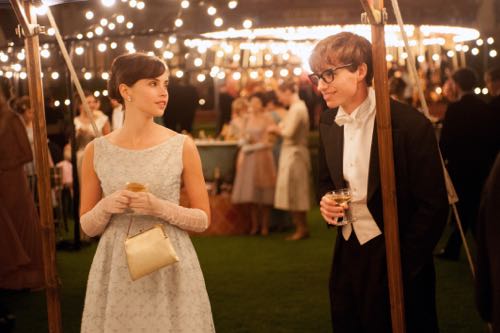
Simply from a filmgoer’s perspective, it’s almost a shame that we all know the story of Stephen Hawking. Because I can’t even imagine how harrowing The Theory of Everything might’ve been if we didn’t know that Hawking, well, made it.
When Hawking (Eddie Redmayne) was 21 years old—and the most promising young physicist at Cambridge University—he was diagnosed with ALS and given two years to live. After being told the grim news of how the disease would ravage his body—total loss of motor control, including, ultimately the ability to move, talk, or even swallow—he had one question: Will it affect my brain? No, the doctor explained. Your thoughts will remain intact. It’s just that you’ll have no way of expressing them.
It was ironic that Hawking’s theories had to do with the nature of time—did it have a beginning? how will it end?—because he suddenly found himself in a race against the very thing he was studying. His first instinct was to hermetically hole himself up in his dorm room, to spend what was left of his life working on theorems. After all, what was the point of engaging with the outside world when he had nothing to offer it? But his college girlfriend Jane (Felicity Jones) wanted no part of that. “I love you,” she told him. And I want to spend whatever is left of your life together.
So she married him—prepared to love and care for him until the bitter end. But we all know what happened next: Remarkably, Hawking lived and keeps on living. So what if a love story is supposed to have an expiration date and then . . . doesn’t? That’s the intriguing premise of the film.
As Hawking, Redmayne is as good as advertised, perhaps even better.The physical transformation is simply uncanny—you may not be able to distinguish between photos of the real man and the actor. But equally impressive is the way he’s able to show Hawking’s genius, wit, playfulness, and obstinance, even through the crushing disability.
In some ways, The Theory of Everything is a tribute to caregivers, the people who quietly and efficiently give up their own freedom to tend to others. There’s a wonderful moment where Jane and Stephen are having lunch at his family’s summer home and Stephen begins to choke. Everyone panics except for Jane—who matter-of-factly just deals with it. Felicity Jones plays this aspect beautifully.
And Jane isn’t simply a devoted servant to her brilliant husband—she loves him and is able to make love to him, too. (Sexual arousal is not part of the brain’s system, explains Stephen to his confused best friend Brian, played by Harry Lloyd. “That explains a lot,” Brian replies.) They have three children together. Eventually, though, other people encroach on their lives: Jonathan (Charlie Cox) the sweet church choir conductor who is hopelessly in love with Jane; and Elaine (Maxine Peake), the brassy live-in therapist who seems to really get Stephen.
The Theory of Everything may not be a traditional love story, but it is a love story all the same. It’s directed handsomely by James Marsh, who perhaps overly emphasizes the dreamy “their love was in the stars” aspect of Stephen and Jane’s story, but who can really blame him?
Back when I was doing my syndicated radio show, we used to give what we called the “Max and Mike on the Movies Guarantee.” This was a film that we knew everyone would like: You, me, your grandma, the guy who owns the hardware store down the street. This is high praise, but of course not the highest praise (a truly great work of art always has its detractors). The Theory of Everything gets that guarantee. It’s not a masterpiece, but it’s a deeply satisfying story about one man’s genius and one woman’s strength.
